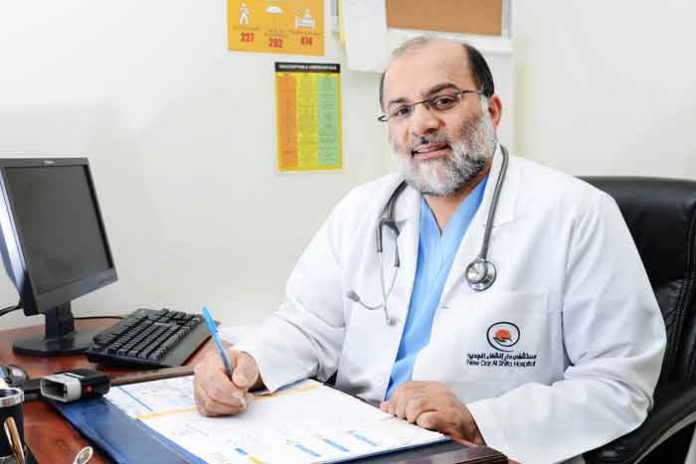DR. SAAD AL-KANDARI
Cardiology Consultant, Canadian Fellowship and American Board of Internal Medicine, Cardiovascular Medicine, Interventional, sub-specialty cardiology.
Having graduated from the Royal College of Surgeons, in Ireland, in 1996, getting through the internal medicine program in Canada and having obtained the Royal College of Canada degree as well as the American College of Internal Medicine, Dr. Saad Al-Kandari, specializes in interventional cardiology.
Since 2005, he has been practicing general cardiology, interventional coronary procedures and stenting. In Dar Al Shifa, the cardiologist has been for the last, almost-three-years now.
“I had major interest in heart, to deal with, as an organ. This was after finishing my under-graduation training. I was really thinking between two aspects of cardiology –to go for cardiac surgery; do open-heart surgery, or to go for cardiology and do intervention,” said Dr. Al-Kandari.
After an exposure in the field of cardiac surgery, in the early times of his training career, he chose interventional cardiology. “I liked the interventional more than the open-heart, although, it was an interest, in the beginning, but once I got exposed to open-heart, I preferred the catheter-based surgeries,” he revealed.
“However, what initiated me more into cardiology was my experience in medical school. Cardiology is the specialty that depends, majorly, on patients’ symptoms rather than on tests. Right from the beginning of a conversation with a patient, cardiology gives you this privilege to know what disease a patient has,” he spoke, of his fondness for cardiology, with a smile.
Especially, referring to the period of the onset of his career, he said, “As students, we were very excited of the fact that when you see a patient, you diagnose angina, you diagnose heart failure, just from the beginning. So, that is one of the reasons that made me think more and more of cardiology. Besides, I had a very interesting professor for cardiology, when I was in Ireland, in medical school; maybe he was the one who pushed me into cardiology, more and more.
If I was to go years back, I would still choose the same.” The Royal College of Surgeon, Ireland, is a private college dealing with the Arabic and Gulf region and to get into the college is a major challenge, in itself. “In a class, then, out of 60, a minimum of 15 students would be Arabic, another 15 from Asian countries and the rest were Irish. We had a good number of Arabic there,” commented Dr. Al-Kandari.
“The first year was the toughest, although it was not medicine; you have to study secondary school, which means you have to go the national board and be examined as an Irish student and then compete them,” he continued.
As an 18-year old traveling for the first time to Europe, for his studies, Dr. Al-Kandari thought of quitting, in the first week: “I called my parents to, basically, support me and tell me to stay there. But when I called them, my mother started crying and said, ‘Just come back. We do not want you to stay there. Just come back.’ I was ready to get my tickets and go back home the next day. But for some reason, the next day, I woke up with totally different kind of emotions and I went up to the college.”
For the heart patients, the heart issues are not isolated from the rest of the body’s issues; they are very much connected to the lungs, the kidneys and other organs. Of the cardiac healthcare, at Dar Al Shifa, he said, “Within heart care, we have a general cardiology where we prescribe medicine, treat high blood pressure, high cholesterol, counsel about smoking and life style, and weight loss. We get more advanced when we do patient diagnosis through tests, do angiograms, ballooning and stenting. In some cases, where angioplasty is not possible due to lots of blockages in the vessels, bypass surgery comes in, done by our colleagues. ”
After earning his degrees, he returned to Kuwait to join the Farwaniya hospital and of the stark increase in the number of heart patients since then, he said, “One hospital was enough to accommodate the heart patients in the country then, but since five years to now, there is almost 30 percent increase in the number of cases.”
Making a note on how Kuwait’s Healthcare system fairs, especially in the field of cardiology and cardiac surgeons, he commented, “North America and Europe are more advanced in terms of their approach to systems. All of my colleagues, here, are well trained and professional in dealing with any case but the problem is in coordination between all the specialties,” pointing towards the shortcomings of the administrative competencies of Kuwait.
He furthered, in the same context, “There should be 25 percent administrative resource for 75 percent professionals but in Kuwait, it is the reverse. Also, absence of a real job description is another issue. As a result, professionals get the jobs they should not get. This becomes a burden and compromises the patient-care. The system in Kuwait is quiet complicated; the Ministry of Health is not isolated, it is connected to other ministries. This connection, itself, to take a decision, delays the process.”
Since working for a long time in the country, we asked him of the kind of patients he receives, in terms of their gender and age and if he finds a gender- and age-specific relation between the patients and their kinds of diseases. The doctor said, “When we were in North America we thought that we tended to a lot diseases but when we came here, we were astonished at the scale and penetration of various diseases found in the patients.”
On subject of the often found presentation of heart attacks being, primarily, associated with men, the doctor said, “Coronary heart disease or heart diseases, in women, itself is like textbook. Physiologically, women, before reaching the age of menopause, are at a lower risk of heart diseases, than their male counterparts. This is because of the hormones; the estrogen has a major protective effect on the vessels than in the absence of the hormone. Once they reach the ages of post-menopausal —around 50—they become equally susceptible, as their male counterparts, to the risk of heart attacks and heart disease percentages.”
He explained that atypical symptom presentation, of females, is one factor of such association: “Usually textbooks and patients describe heaviness and burning sensation in the chest. But women can present in a totally different way; they come in with a bit of pinching here and there, bit of numbness here and there, feeling uncomfortable, maybe abdominal pain or totally different presentation compared to males. That is why the disease or the symptoms get underestimated.”
He furthered, “If we compare 60-year old males and females, with heart diseases, the female heart diseases are, usually, more aggressive and more deeply penetrated, mostly, because they are diagnosed late.”
Quoting statistics, he explained, “If we look at the studies done in Europe and North America, the average age of patients having heart attacks, for male, is 55–60 years and for females, about 65–70 years. While the studies in the Gulf region indicate the average ages as 45–50 years. So, we are dealing with much younger patients having heart attacks.”
He agrees with various researches considering diabetes as the major risk factor for the shift and comments, “Again, if you look at 100 European heart-patients, typically, 20 percent of them are diabetic whereas, locally [in Gulf], 80 percent of the female heart-patients are diabetic and 60 percent male heart-patients are diabetics. Diabetes is a major burden, in our society, with a negative impact.”
Dr. Al-Kandari also spoke of the direct relation between smoking and risks of heart diseases, “Not less than 50 percent of our [Gulf] heart patients are smokers. Earlier, we were surprised to receive 50 year-old heart patients but now people are coming in, at the age of, as early as, 30.”
He also noted, “We also face much more aggressive diseases; it is not just one vessel or one spot that can be treated. Usually, three or more vessels are under stress and their disease seems to be affecting the coronary and the hearts in a larger magnitude.”
Over the span of his career, he noticed an increase in the number of cardiac patients, their diseases and their diversity with elevated cholesterol, high blood pressure, diabetes, obesity and lack of physical activity. The various growth and hormonal medicines, taken by youngsters for a better body image, acting as a counter-balancing factor for the body and a healthy heart, are also counted in by him.
He also considers red meat and eggs as the major contributors for cholesterol; and warns of the ‘dumping syndrome’; habits such as having larger meals and eating late at night, adding to heart risk.
Dr. Al-Kandari recommends 20-30 minutes of exercise, light dinners before 8pm, watching weight twice, monthly, and believes that positive emotions and perceptions matter when it comes to having a healthy heart.























